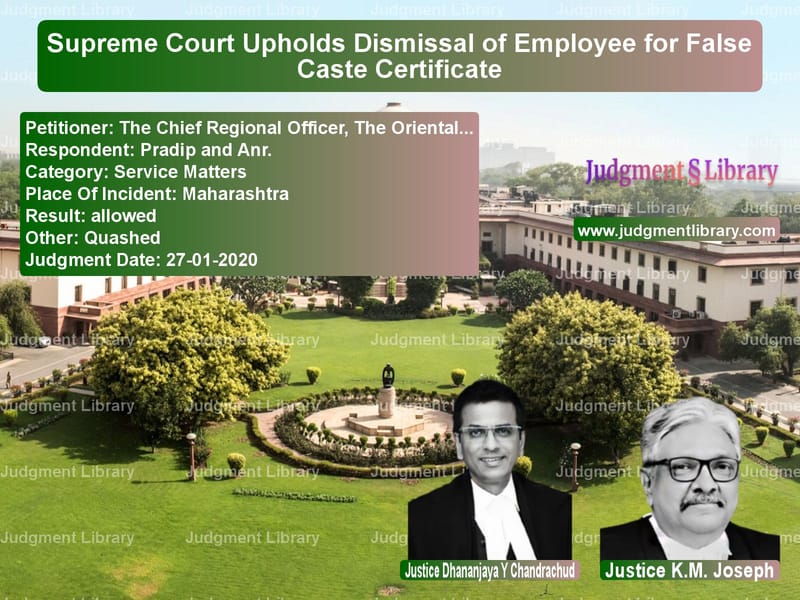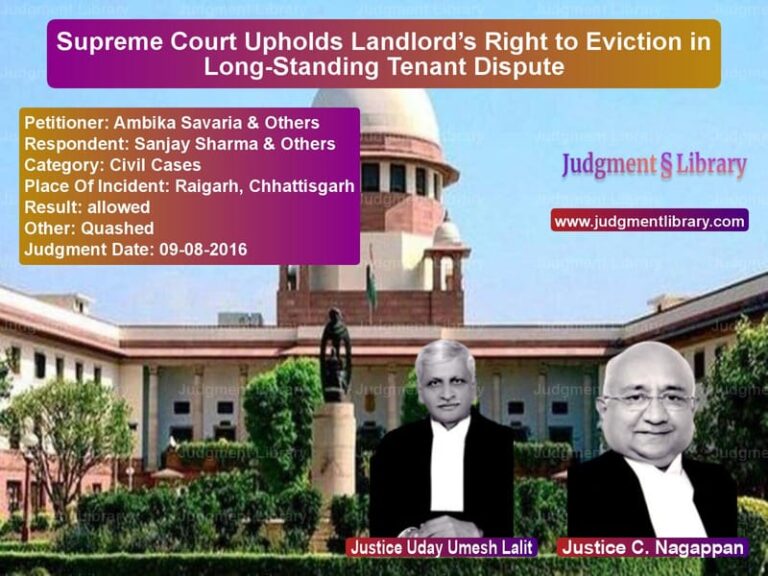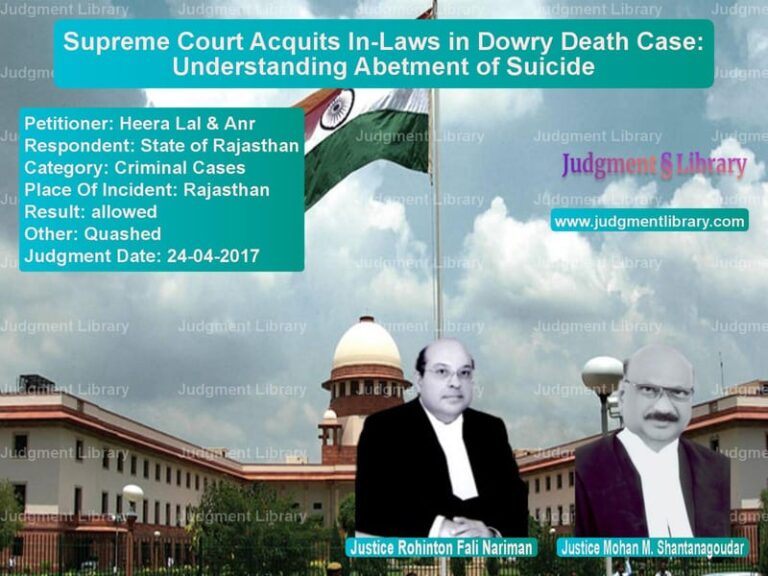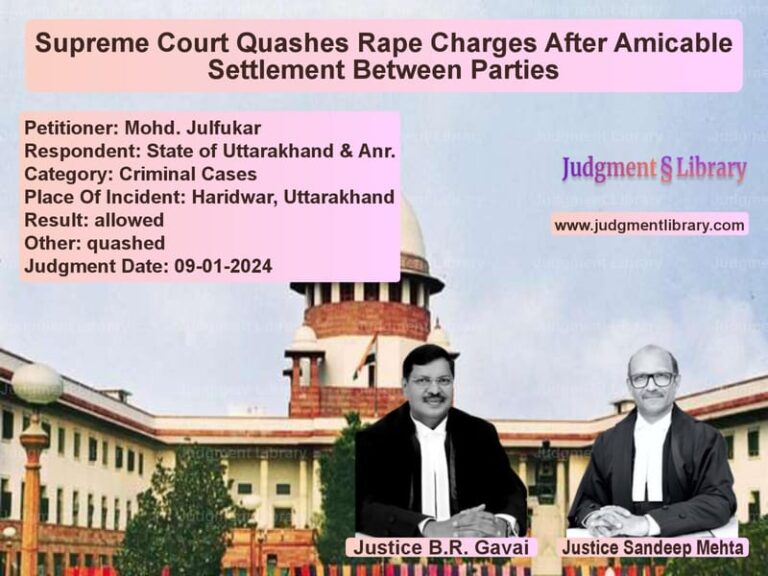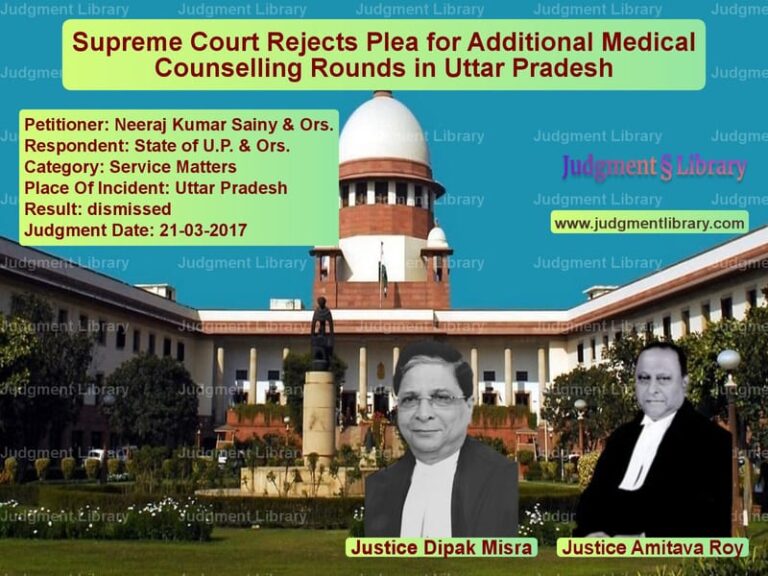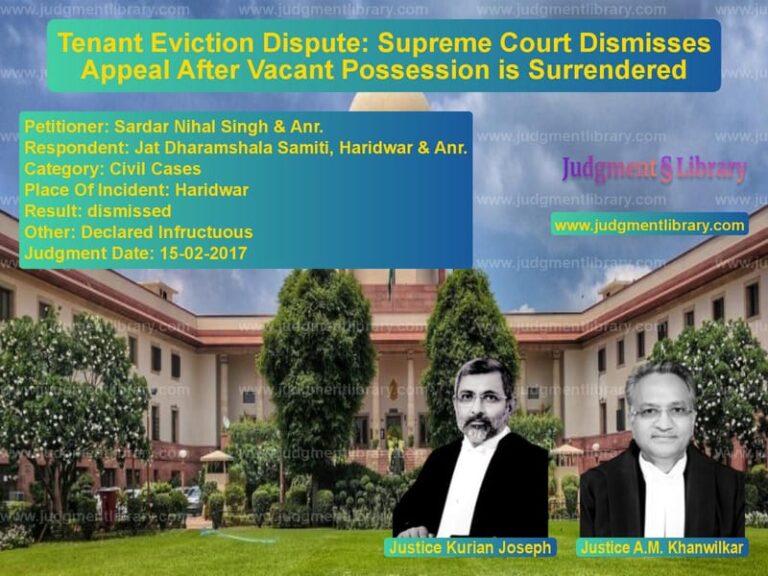Supreme Court Upholds Dismissal of Employee for False Caste Certificate
The case of The Chief Regional Officer, The Oriental Insurance Co. Ltd. vs. Pradip and Anr. is a landmark ruling that addresses the invalidity of caste certificates and its implications on employment benefits. The Supreme Court ruled that an appointment secured on the basis of a false caste certificate is void ab initio and upheld the dismissal of the employee.
Background of the Case
- The respondent, Pradip, was appointed as an Assistant in The Oriental Insurance Co. Ltd. based on a caste certificate stating that he belonged to the Dhangad Scheduled Tribe.
- Investigations revealed that he actually belonged to the Dhangar community, which is classified as a Nomadic Tribe, not a Scheduled Tribe in Maharashtra.
- The employer (appellant) sought verification of his caste certificate from the issuing authority, which confirmed that the certificate was not recorded in its official records.
- The respondent applied for a fresh caste certificate, but the Scrutiny Committee invalidated his claim on April 25, 2016.
- The Scrutiny Committee found that all documents submitted by the respondent pertained to the Dhangar community and did not support his claim to the Dhangad Scheduled Tribe.
- The respondent approached the Bombay High Court, seeking protection of his employment despite the invalidation of his caste certificate.
- The High Court, relying on a previous Full Bench ruling in Arun Sonone v. State of Maharashtra, directed that his services be protected.
- The insurance company challenged the High Court’s order before the Supreme Court.
Legal Issues Considered
- Whether an appointment secured on the basis of an invalid caste certificate remains valid.
- Whether the High Court erred in relying on the Arun Sonone decision to protect the respondent’s employment.
- Whether the employee was entitled to continue in service despite his caste certificate being declared false.
- Whether an employer has the right to terminate an employee whose appointment was obtained based on incorrect caste claims.
Arguments of the Petitioner (The Oriental Insurance Co. Ltd.)
- The employer argued that the respondent secured employment fraudulently by claiming Scheduled Tribe status.
- The Scrutiny Committee, a statutory body, found that the caste certificate was not genuine and that the respondent had no legitimate claim to ST reservation.
- The Supreme Court, in Chairman and Managing Director, Food Corporation of India v. Jagdish Balaram Bahira, had ruled that appointments based on false caste claims are void ab initio.
- The High Court erred in granting service protection by relying on Arun Sonone, which was later overruled by the Supreme Court.
- Allowing the respondent to continue in service would deprive a genuine Scheduled Tribe candidate of the reserved job.
Arguments of the Respondent (Pradip)
- The respondent argued that he had been employed for over 30 years and should not be dismissed due to a technical issue with his caste certificate.
- He had relied on the caste certificate issued by the Executive Magistrate, which should not be held against him.
- The High Court’s ruling in Arun Sonone provided protection to employees whose caste certificates were invalidated after long service.
- Since he had not personally forged the certificate but received it from an official authority, he should not be penalized.
- He had applied for a caste validation before the Scrutiny Committee, and the delay in processing was beyond his control.
Supreme Court’s Observations
- The Supreme Court emphasized that appointments obtained on the basis of false caste certificates are illegal from the outset and cannot be regularized.
- The judgment in Jagdish Balaram Bahira established that a false claim to reservation deprives legitimate candidates of their rightful opportunities.
- The Court held: “Once a caste certificate is invalidated, the appointment is rendered void ab initio. The individual cannot claim an equitable right to retain a post secured through misrepresentation.”
- It rejected the argument that long years of service could justify protection, stating that fraud vitiates all benefits derived from it.
- The High Court’s reliance on Arun Sonone was misplaced, as that ruling had been overruled by the Supreme Court in a three-judge bench decision.
Final Judgment
The Supreme Court ruled as follows:
- The Bombay High Court’s order protecting the respondent’s employment was set aside.
- The respondent’s appointment was declared void ab initio, and his employment with The Oriental Insurance Co. Ltd. was terminated.
- Employers have the right to dismiss employees who secured jobs through false caste claims.
- The ruling set a precedent that long years of service do not entitle a person to protection if their initial appointment was based on misrepresentation.
This decision reinforces the integrity of the reservation system and ensures that jobs reserved for Scheduled Tribes are not wrongly claimed by ineligible candidates.
Petitioner Name: The Chief Regional Officer, The Oriental Insurance Co. Ltd..Respondent Name: Pradip and Anr..Judgment By: Justice Dhananjaya Y Chandrachud, Justice K.M. Joseph.Place Of Incident: Maharashtra.Judgment Date: 27-01-2020.
Don’t miss out on the full details! Download the complete judgment in PDF format below and gain valuable insights instantly!
Download Judgment: The Chief Regional O vs Pradip and Anr. Supreme Court of India Judgment Dated 27-01-2020.pdf
Direct Downlaod Judgment: Direct downlaod this Judgment
See all petitions in Employment Disputes
See all petitions in Public Sector Employees
See all petitions in Termination Cases
See all petitions in Judgment by Dhananjaya Y Chandrachud
See all petitions in Judgment by K.M. Joseph
See all petitions in allowed
See all petitions in Quashed
See all petitions in supreme court of India judgments January 2020
See all petitions in 2020 judgments
See all posts in Service Matters Category
See all allowed petitions in Service Matters Category
See all Dismissed petitions in Service Matters Category
See all partially allowed petitions in Service Matters Category

